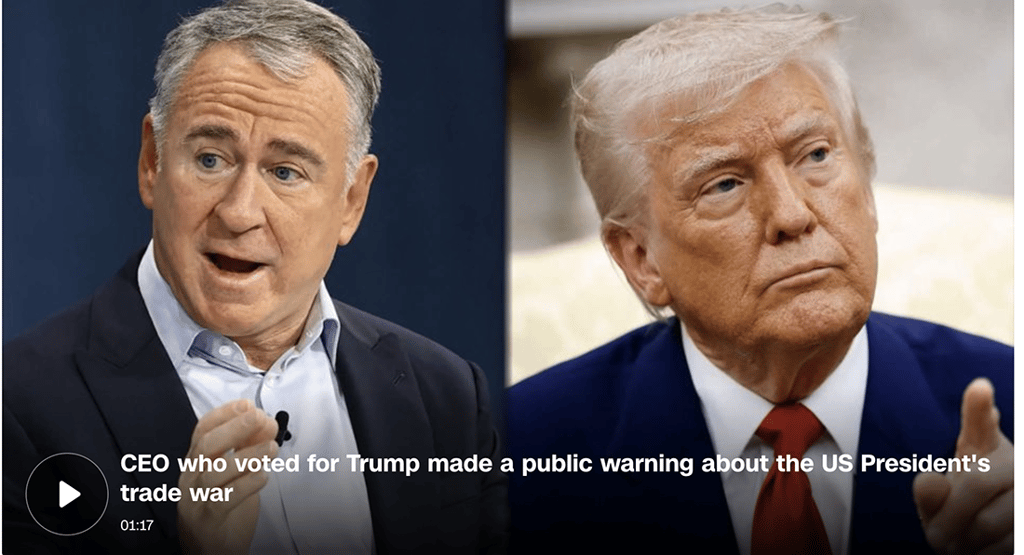Trump’s Trade War: A Billionaire Backer Sounds the Alarm
4/25/20253 min read


Trump’s Trade War: A Billionaire Backer Sounds the Alarm
By Boncopia, April 25, 2025
Ken Griffin, the billionaire CEO of Citadel and a prominent supporter of President Donald Trump, just dropped a bombshell at the Semafor World Economy Summit in Washington. His message? Trump’s trade war is tarnishing America’s global reputation and shaking the confidence of investors worldwide. For a megadonor who’s funneled millions into Republican campaigns, this public critique is a bold move—and a wake-up call. Let’s unpack why Griffin’s warning matters, how Trump’s tariffs are reshaping America’s image, and what it means for the nation’s economic future.
The Trade War’s Toll on America’s “Brand”
Griffin didn’t mince words when he described the United States as more than just a country—it’s a brand. Think about it: Hollywood’s global influence, Wall Street’s financial muscle, and the Pentagon’s unmatched might have long made America a symbol of aspiration. From iPhones to Ivy League degrees, the U.S. has sold the world on its promise of innovation, stability, and opportunity. But Griffin argues that Trump’s trade war is chipping away at this carefully crafted image.
The trade war, marked by steep tariffs on imports from China, the EU, and other trading partners, was pitched as a way to bring jobs back home and level the playing field. Yet, the fallout has been messy. Higher tariffs have driven up costs for American consumers and businesses, sparked retaliatory tariffs from other nations, and disrupted global supply chains. Griffin’s concern isn’t just about economics—it’s about perception. When America slaps unpredictable tariffs on allies and adversaries alike, it risks looking erratic, not strategic.
Investors Are Getting Nervous
As the founder of Citadel, one of the world’s largest hedge funds, Griffin knows a thing or two about how money moves. He warned that investors are starting to rethink parking their cash in the U.S., particularly in Treasury bonds—the bedrock of global finance. Why? Because Trump’s tariffs signal that America might not be the steady, rational player it’s been for decades. When faith in U.S. predictability wanes, so does confidence in its financial instruments.
Treasury bonds are supposed to be the safest bet in the world, backed by the full faith and credit of the U.S. government. But if global markets see America as a wildcard, demand for those bonds could slip, driving up borrowing costs and squeezing the economy. Griffin’s point is clear: tariffs aren’t just a trade policy—they’re a gamble with America’s economic credibility.
A Republican Donor Breaks Ranks
What makes Griffin’s critique so striking is his political allegiance. As a major Republican donor and Trump supporter, he’s not the usual suspect to call out the president. His willingness to go public suggests a growing unease among the business elite, even those who’ve backed Trump’s agenda. It’s a reminder that loyalty doesn’t mean blind agreement, especially when the stakes are this high.
Griffin’s comments also highlight a tension within the Republican Party. While Trump’s base cheers his “America First” stance, business leaders like Griffin worry about the long-term costs. Tariffs might score political points, but they risk alienating the global markets that fuel America’s prosperity. It’s a classic case of short-term populism clashing with long-term strategy.
The Bigger Picture: America’s Global Standing
Beyond economics, Griffin’s warning touches on something deeper: America’s role in the world. For decades, the U.S. has been the linchpin of the global order, championing free trade, open markets, and international cooperation (however imperfectly). Trump’s trade war, with its go-it-alone ethos, challenges that legacy. Allies like the EU and Canada, stung by tariffs, are forging their own trade deals, while China is doubling down on its global influence. The result? America risks looking isolated, not dominant.
Griffin’s point about “eroding the brand” isn’t just about dollars and cents—it’s about soft power. When America’s actions breed uncertainty, it loses the intangible clout that comes with being a trusted global leader. That’s a loss no tariff can recoup.
What’s Next?
Trump has shown little appetite for backing down on tariffs, framing them as a badge of economic patriotism. But Griffin’s critique could spark a broader debate, especially as the 2026 midterms loom. Will other business leaders echo his concerns? And how will Trump balance his base’s demands with the economic realities Griffin highlights?
For now, the trade war’s ripple effects are undeniable: higher prices, strained alliances, and a dent in America’s global prestige. Whether Trump heeds voices like Griffin’s—or doubles down—will shape the nation’s trajectory for years to come.
Thought Questions for Readers
Do you think Trump’s tariffs are worth the cost to America’s global reputation, or is Griffin right that they’re doing more harm than good?
How much should America prioritize its “brand” as a global leader versus protecting its domestic industries?
Can the U.S. maintain its economic dominance if investors lose faith in its predictability?
Photo Credit: CNN.com.
hello@boncopia.com
+13286036419
© 2025. All rights reserved.